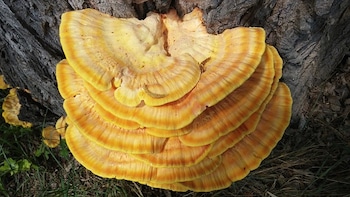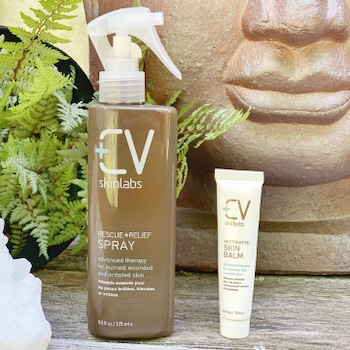
PracThe Do you know what helps heal a damaged skin barrier?
You may not have thought about it. You’re focused on fixing fine lines and wrinkles, sagging, dryness, and irritation.
Thing is, all of these are signs of a damaged skin barrier. This is the outermost layer of skin that helps seal in moisture and provides protection to the skin cells underneath.
When this barrier is damaged, you lose moisture and your skin is more likely to be damaged by the sun and other environmental assaults. The result? Sagging, fine lines, wrinkles, dryness, irritation, and more.
To help heal the damage, we’ve got 8 star ingredients you’ll want to look for in your skincare products.
Damaged Skin Barrier Healer 1: Beta Glucan
Beta-glucan is a type of fiber found in healthy foods like oats, wheat, and barley. It’s not only good for you when you eat it, but it’s good for the skin too.
Anyone with a compromised skin barrier should use beta-glucan. It’s a humectant moisturizer, which means it pulls moisture into the skin. But it does more than that. It also helps repair skin cells, prevent further damage, plump skin to make it look smoother, and calm irritation.
Oat beta-glucan was found in one study to penetrate deeply into the skin and significantly reduce the appearance of fine lines and wrinkles.
2: Aloe Vera
Aloe is known to be a soothing, healing ingredient. You know how it feels on a new sunburn! That’s the natural anti-inflammatory properties going to work for you.
These same properties help heal a damaged skin barrier, calming inflammation and soothing irritations. Aloe is naturally hydrating, and contains vitamins A and C, too, which help repair damaged skin and boost brightness.
Damaged Skin Barrier Healer 3: Sea Buckthorn Oil
Sea buckthorn is a flowering shrub that produces little orange berries. Cold-pressing these berries produces a smooth oil that is rich in vitamin C. Sea buckthorn berries can carry 10 times as much vitamin C as an orange! They’re also high in vitamin E. Both of these vitamins act as antioxidants, protecting the skin from damaging free radicals.
The oil contains linoleic acid as well, which is found naturally in skin sebum (oil). This makes the oil naturally hydrating, and with regular use, it can help prevent and treat dryness. Other benefits include fading hyperpigmentation, protecting against germs and infection, and improving the appearance of fine lines and wrinkles.
4. Turmeric
Turmeric is a common spice used around the world, but it’s also a wonderful skincare ingredient. Its main claim to fame is its powerful ability to reduce inflammation. Many studies have shown that it does a great job at this.
By reducing inflammation, turmeric helps heal a damaged skin barrier. It’s also rich in antioxidants, which go on to protect the skin from further damage. And like sea buckthorn oil, it has antimicrobial benefits too, which means it will help kill bacteria and save the skin from infections and breakouts.
In a 2016 review, researchers found that turmeric provided significant improvement in those with skin diseases like acne, atopic dermatitis, psoriasis, and photoaging.
 Damaged Skin Barrier Healer 5: Reishi Mushroom
Damaged Skin Barrier Healer 5: Reishi Mushroom
Mushrooms are some of the latest superstar ingredients in skincare. Practitioners used them in traditional medicine for centuries, but it’s only recently that the beauty industry has discovered them.
Reishi mushroom, in particular, has a lot of properties that help heal a damaged skin barrier. These include:
- Anti-inflammatory: reduces inflammation, allowing the skin to repair itself.
- Anti-redness: tames redness, giving skin a healthier appearance.
- Antioxidant: protects from damaging free radicals.
- Anti-wrinkle: fades the appearance of fine lines and wrinkles.
Interestingly enough, Reishi contains beta-glucans, our first ingredient! This helps attract moisture to the skin while other properties of the mushroom go to work promoting skin regeneration and healing.
6. Jojoba Oil
Jojoba is a shrub that grows in the dry regions of northern Mexico and the southwestern U.S. The oil comes from the seeds and has a variety of skin-care benefits. It also helps hair regrowth.
Jojoba is particularly good for those with a damaged skin barrier. It’s a proven anti-inflammatory and has a high concentration of wax esters that fill in cracks and smooth out damaged skin. In a 2018 study, researchers noted that jojoba oil is “a good repair option” for those with damaged skin barriers, particularly those suffering from eczema, dermatitis, and acne.
They added that because of its anti-inflammatory effects, jojoba also has the potential for use in skin infections and skin aging.
Damaged Skin Barrier Healer 7: Bisabolol
Bisabolol comes from chamomile and other plants and helps soothe skin. Companies use it in formulas designed for sensitive skin, because it helps calm and ease irritations and inflammation. It also seems to have some ability to fade discolorations.
A thick, oily liquid, bisabolol penetrates deeply into the skin, reducing inflammation even after sunburns. Chamomile itself is known as a skin healer. Bisabolol, which is a concentrated form of chamomile, can help speed up the healing process even more, while its anti-microbial properties help protect from infection.
Rich in panthenol—a natural humectant—bisabolol pulls moisture into the skin, fighting dryness and reducing the appearance of fine lines and wrinkles. It also stimulates collagen production, helping promote healing and keeping the skin firm.
 8. Vitamin E
8. Vitamin E
Manufacturers have used Vitamin E for decades in skincare products, and for good reason.
First, it’s a powerful antioxidant, so it protects against damage from free radicals. Next, it’s naturally moisturizing, so it fights dryness and keeps the skin supple. In fact, it works both as a humectant—attracting moisture to the skin—and an emollient, which traps water in the skin. This makes it excellent as a skin-repairing ingredient.
Third, it penetrates deeply into the skin, soothing and healing the skin barrier and closing the cracks in it to help prevent moisture from escaping. Because it’s fat-soluble, it preserves the lipids (fats) in the skin, keeping it plump and firm.
In a 2016 study, researchers noted that vitamin E has been in use for more than 50 years in dermatology, as it protects skin from sun damage while fighting off free radical damage. Vitamin E also helps reduce inflammation, making it perfect for those with eczema and dermatitis.
Do Your Skin Care Products Contain These Damaged Skin Barrier Healers?
Other ingredients help heal a damaged skin barrier, but those listed above are some of the heavy hitters.
Check your skincare products. Do they contain these ingredients? If you use CV Skinlabs, they do! Look at the ingredient decks and you’ll see!
Do your skin products contain ingredients that help heal a damaged skin barrier?
Featured image by SHVETS production from Pexels.

